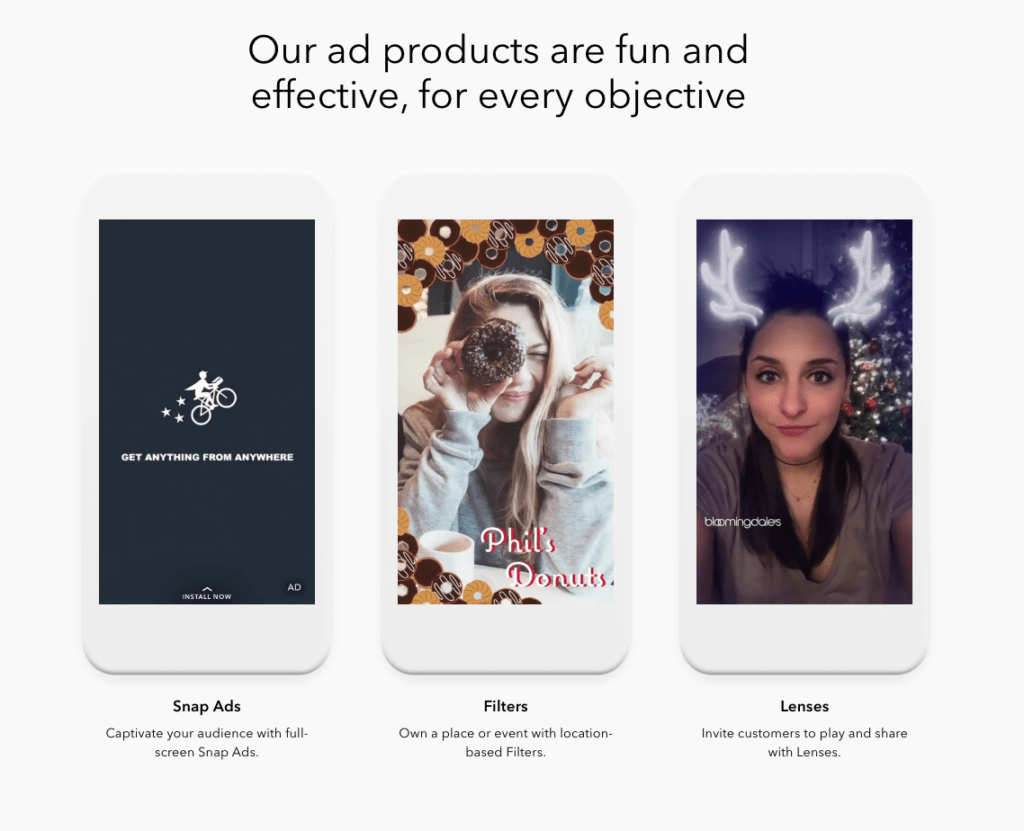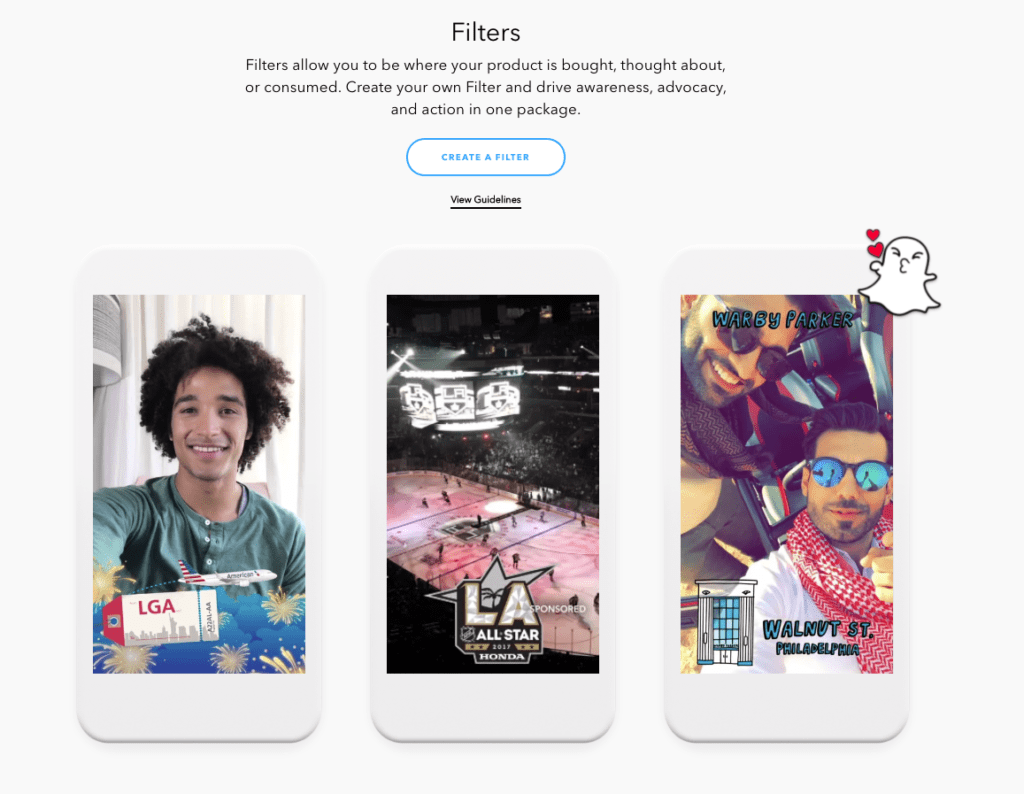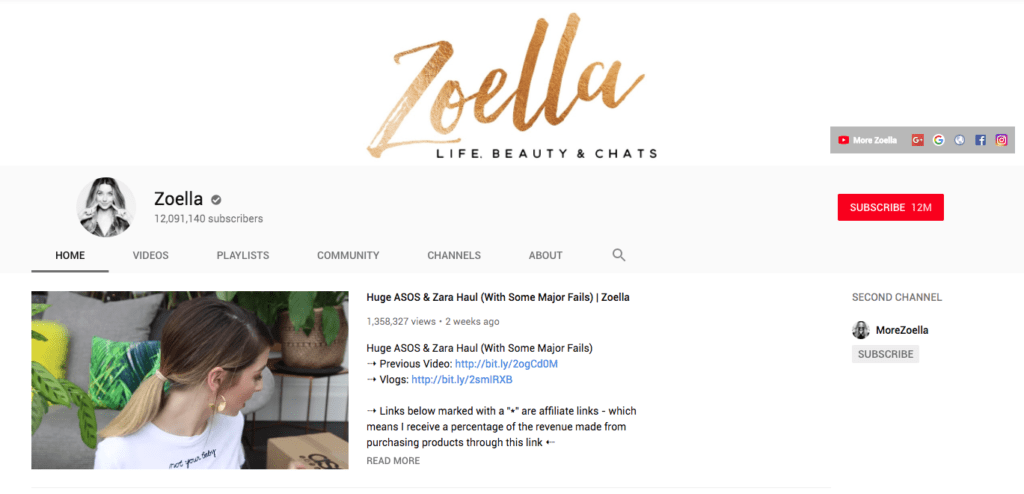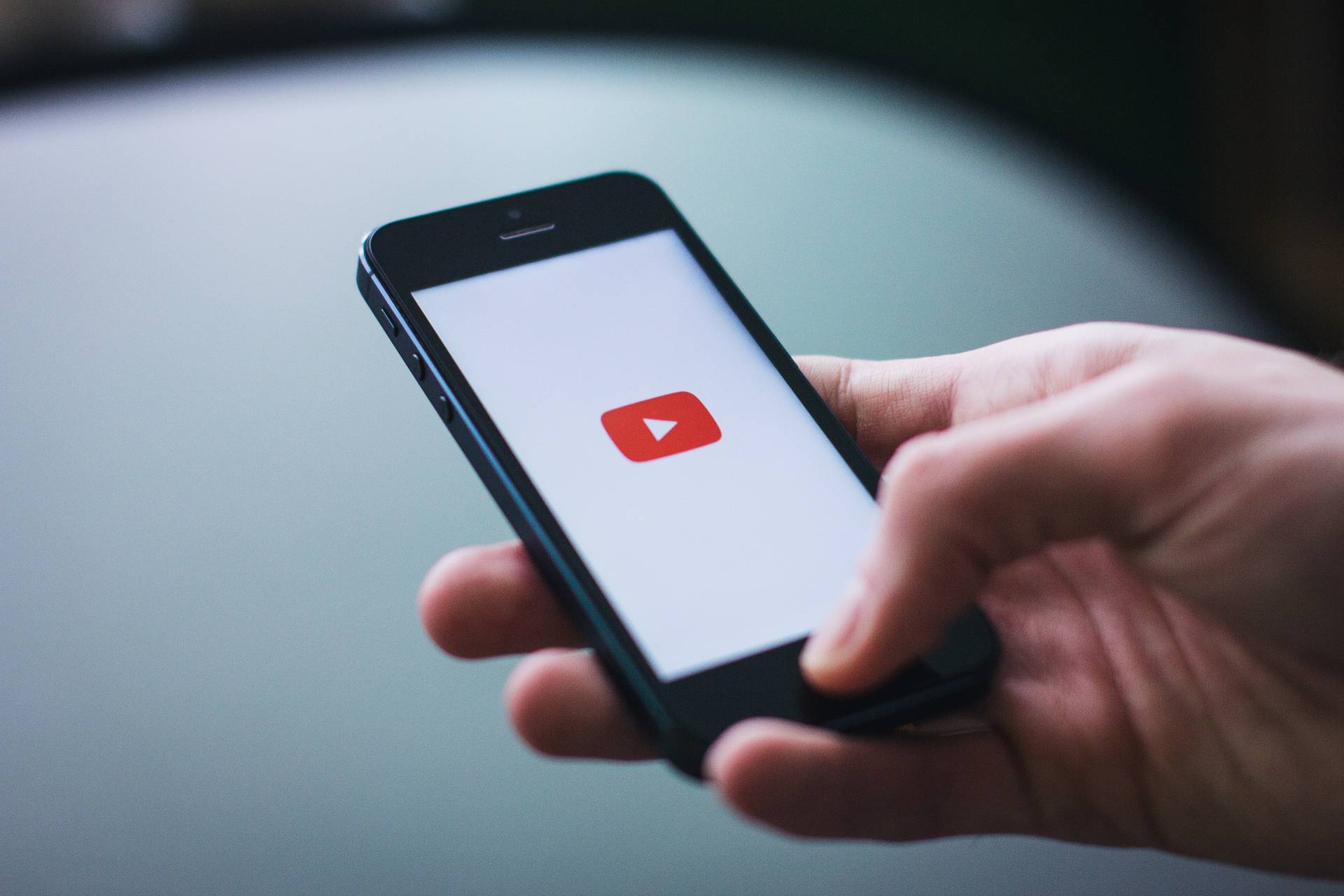Aside from the obvious social channels like Facebook, Twitter and LinkedIn, there are other great sites that you can try for business use. This article is going to explore why Snapchat and YouTube could be an ideal fit for your business’ social strategy.
Snapchat
Snapchat is a strictly mobile-only visual social media channel, popular for its disappearing content. Users can send photos and videos to one another lasting 10 seconds or to their public Stories which will disappear in 24 hours. Since it came onto the social media seen in 2011, Snapchat has seen various updates adding chat, messaging, image storage, events and media content to the application. Content can now easily be saved and uploaded across multiple social channels which is why it’s such a loved tool by it’s 150 million-plus users.

Business Insider reports 158 million use Snapchat every day, opening it, on average, 18 times daily. Another survey from Variety also showed 63% of users said the main motivation for using the app was to message friends.
The most recent changes to the app allow videos to be played in a “loop”. This means they automatically repeat until the viewer taps their screen causing it to disappear. Images can still be shown for either 1-10 seconds or again, until the viewer clicks for it to disappear. This makes the content viewable for longer and as a result has been received well by users. Alongside these changes, the app has completely reorganised its layout too. For more on the update, see here.
Now that you understand a little more about the instant messaging app that is Snapchat, let’s take a look at why it’s great for business use.
Why is Snapchat great for business use?
Posts on snapchat, regardless of the new update are temporary. Hence, there is less need for the content to be of the highest-quality. Instead of spending hours creating a great visual, you’re able to give users live updates that are easy to do and get content in the eyes of your customers almost immediately.
Documenting day-to-day operations in your business or live footage when you’re out at events, gives your viewers a exclusive peak at content they won’t find on your website and even other social channels. It’ll add to the enjoyment that users get when watching your stories and help to generate more awareness and interest in your brand.
Businesses are most likely to use Snapchat for its Stories as this targets a bigger, generic audience. When wanting to communicate one on one with users, direct messaging it okay, however, due to the content disappearing, if important information is needed to be saved, this would cause problems.
Important: It’s good to keep in mind that only users who have added you on Snapchat can view the story content. However, once you have an audience, the story feature allows you to easily create story-driven and interactive content.
Snapchat Analytics
Snapchat offers some basic analytics built into it. You can see how many and which specific users, viewed your story. You can also see if a user has opened the image or video sent directly to them and when it was opened.
Tips for Snapchat Business Use
1. Upload content regularly
Like any good marketing strategy, content needs to be published regularly. Don’t let your followers forget that you exist. Content on your Snapchat Story disappears after 24 hours, so remember to upload daily content.
2. Interact directly with users
As stated above, 63% of users interact with the app to message friends. Be sure to answer any messages that come your way and be personal with your responses. Address them by their name or username. The same applies when replying to photo or video snaps.
For businesses who have may already have a large audience and following, make use of this on Snapchat by sponsoring certain features. These include sponsored Snap Ads, Lens and Geofilters.

3. Sponsor A Snap Ad
Sponsoring a Snap Ad will allow you to create a ten-second audio-visual clip. This will help you to raise awareness, increase consideration and drive action. Below are some of the types of snap ads you can create. For more information, see here.
- Snap ads with web view. These drive traffic to preloaded websites. With the Autofill feature, Snapchatters can send you their account email and more by simply tapping on the ad.
- Snap ads with app install. These drive installs for your app with a simple swipe and a tap. Users can easily download your app without having to leave Snapchat and being directed elsewhere. Perfect!
- Snap ads with long-form video. Users can swipe up on your ad to view your trailer, short film, how-to or any other video clip.

“Make an impression on a huge audience with the most engaging ad formats on mobile. Inspire potential customers to lean in and learn more, seamlessly driving them to your website or content. Drive foot traffic, sign-ups, app installs, and more with ads that make an impact, fast, and are fun to interact with.” – Snapchat
4. Create A Branded Lens or Geofilter
Lens
Sponsored lenses are probably the most effective method of advertising on the entire platform. The difference between a snapchat lens and geofilter is the lens is animated whereas a filter is static. The animations follow your face and add what’s deemed as a “cool” effect to your snaps. This is cleverly done using facial recognition software to track facial features and apply an animation that follows your facial movements.

The first of the above moving images, shows a sponsored lens from Red Bull. Here you can see a user looking as though she is drinking a can of Red Bull. This was related to the fact that school exams were coming up and hence they were encouraging users to take an energy drink to prepare. For your business, assuming you were a local coffee shop, your lens could be as simple as allowing the user to drink a mug of coffee.
Geofilters
Snapchat’s geofilters allow you to be where your product is bought, thought about, or consumed. As noted above, they are static overlays that are used to jazz up an image or video. They are based on the user’s location meaning when in different countries, cities and even buildings, users will find they have access to filters other people elsewhere in the world, don’t.

You’ve probably noticed that if you use Snapchat in any McDonald’s across the country with your location settings on, a McDonald’s themed geofilter will appear. That’s of course because McDonald’s have a sponsored geofilter. For more information on Snapchat filters, see here.
Remember: Different to most social networking platforms, Snapchat’s messaging services are entirely mobile-based. Meaning, if you want to use the app for your business, your smartphone will be a compulsory marketing tool.
YouTube
Moving on from Snapchat, Youtube is another great social media tool for business use. Aside from being the second largest search engine, YouTube is owned by Google. Hence, the content published to YouTube is a great addition to any online marketing strategy in terms of SEO as these videos are more likely to appear in search results than other websites.
“YouTube is currently ranked No. 2 both domestically and globally, according to internet analytics company Alexa. It has more than a billion users, according to the company, and more than half of all views come from mobile devices.” – Business News Daily

Why Use YouTube for Business?
1. YouTube Live
YouTube has its own live streaming feature, like that seen on Facebook. Currently, YouTube Lives are most popular for sports, news and gaming content. However, just like on other apps, going live on YouTube gives active users live footage of your business perhaps at an event or doing a business tour. This gives users never-before-seen content as it’s done in the present and the same exact footage cannot have been done before.
2. Target Large Audiences By Working With YouTubers
You may have heard of the buzz about “YouTubers” and their “fandoms”. These are essentially personalities, such as those on reality TV, with their own channels and mass group of supporters. From years of living on the “Tube” they’ve maintained an enormous following, sometimes in the hundreds of thousands or millions of subscribers. Many YouTubers specialise in particular areas such as fashion, beauty, food, gaming and travel. Stand out YouTubers includes beauty blogger Zoella and young tech vlogger Marques Brownlee.

So, what does that mean for your business? By working with YouTube personalities in a ‘corporate sponsorship’ you’ll be sure to make a clever business move. By sponsoring a YouTuber you’ll often be required to send them your products for them to mention and use in their videos. You’ll be sure to generate brand awareness and if the product is reviewed honestly and positively, you’ll no doubt have increased sales too. Great!
3. Create Your Own YouTube Adverts
YouTube adverts are seen before, during and after video streaming. They’re in the form of short clips that can also pop up whenever a video is embedded on other pages on the site.
Every time a user watches 30 seconds (or shorter, depending on the clip’s length) of your ad or clicks to “learn more”, you pay. Meaning if a user doesn’t qualify for the above, you don’t pay. In terms of expense, this is beneficial to your business as it will only really mean you pay for those users who show an interest in your content and as a result are most likely to be an active lead for your business.
There are also discovery ads which unlike normal YouTube ads, aren’t limited to 30 seconds in length. These can be as long or short as you wish, though you’ll be charged every time someone clicks on the ad to watch the full video. Discovery ads can be found when a user is searching or browsing content on both YouTube and across the web.
Good To Know: You can choose how much you’re willing to spend on advertising, as well as targeting specific audiences based on age, gender, interests and location.
Further Tips for YouTube Business Use
1. Optimise your video’s title, tags and description. Select relevant keywords you want to target that best describe the video and make sure they’re relevant. This is good practice for SEO purposes and will help audiences find accurate content related to their search term and therefore, interest.
2. Use clickable links to reference other content. YouTube allows you to reference other video content at the end of the video you’ve just streamed, may that content be older or more recent. The reference has a clickable link within it which can also link back to any web pages or sites your video covers. That means you can promote not only video content but your website pages, blog content and so on as well.
3. Create and organise your playlists. If you have videos that are all related by theme it’s best practice to organise these together. For example, as a marketing company you’ll want to create a playlist on all SEO-related videos and a separate playlist for all Social Media videos. This makes navigating to the right type of video a lot easier for the user and results in them finding the most useful content to them, that you have.
4. Promote your content across other social platforms. Having now optimised your videos and organised them into playlists, it’s time to cross promote them on other social channels. Make sure you link back to your videos whenever possible on your website, blog and other social networks. Your links back don’t need to be direct video links. You can link back to your channel in general so that your audience can view your whole YouTube profile and content and also have have the chance to subscribe.
5. Engage with similar videos. Get involved with the YouTube community by “liking” and “commenting” on videos uploaded by other users. This can encourage those users to visit your videos and channel and engage with you in return. Not only this, but it will mean that users who see your content is being interacted with, may feel more pressure to get involved as well.
Important: When engaging with other videos, make sure that they share a similar topic, interest or theme to attract the right viewers. It’s no good encouraging users to view your content if they’re unlikely to have an interest in it. These users may get misled and frustrated as a result of this, which could negatively affect your channel.
Youtube and Snapchat Can Help Further Your Marketing
All in all, as great as social channels like Facebook, Instagram and Twitter are, the online world is growing and it’s time to explore other networks that are just as good. From this article you should have learned just why social app Snapchat is a great mobile marketing tool as well as why YouTube will help get you ranking well on Google and your products talked about by millions of people.
Katie Rose, Digital Marketing Assistant
Katie Rose is Digital Marketing Assistant at iWeb, a leading UK based eCommerce agency. iWeb are certified Magento developers with over 22 years experience designing and developing eCommerce websites.






